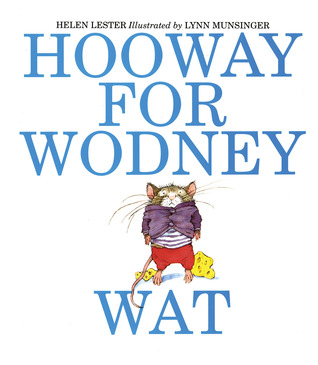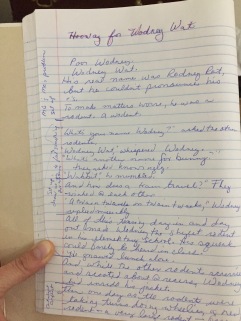
Susanna Leonard Hill hosts a Halloweensie writing contest every year. I’ve entered it for the past three years or so. This year, I tried something new.
I don’t write in rhyme. I don’t have the chops to do it justice, but I love poetry and read it often. In high school, my fantastic English teacher taught us how to write poetry using mentor texts. We basically copied the meter and form, but added our own words.
I wanted to try that with my 2016 Halloweensie entry. I used a stanza from The Rime of the Ancient Mariner by Samuel Taylor Coleridge as my inspiration:
Water, water, every where,
And all the boards did shrink;
Water, water, every where,
Nor any drop to drink.
I won’t put my entry here, you can click on my blog to see it if you like. The point is, by using a mentor text, I can write a solid poem without knowing all the technical aspects of poetry writing. Using a mentor text teaches me, on a visceral level, how to structure a poem, so that when I do apply myself to more in-depth study of poetic forms, I’ll be better prepared.
Mentor texts can work for you in many ways. Reading lots of good picture books eventually impresses into your mind the way a PB should be written. Same with other categories of books. If you take it a step further, you can break the mentor text down and analyze one aspect of it to help you with your weaknesses.
I recently used the text of one of my favorite books, Helen Lester’s Hooway for Wodney Wat, as a mentor text. Lester is a master at character development and plotting, not to mention hu mor and just about everything else you need to write good picture books. I wanted to see how she pulled of structuring her story, so I wrote it out in long hand.
mor and just about everything else you need to write good picture books. I wanted to see how she pulled of structuring her story, so I wrote it out in long hand.
In the first paragraph, she sets up the MC and the MC’s problem:
Poor Wodney. Wodney Wat. His real name was Rodney Rat, but he couldn’t pronounce his r’s.
Her next paragraph builds on how awful it is for Wodney, a rodent–wodent, to have this problem. We see how the other rodent kids tease him and how, little by little, he retreats inside his jacket. We now feel for Wodney and we want something good to happen to our sad little wodent.
But the nemesis enters–Camilla Capybara. She makes things worse for Wodney and the other kids at PS 142 Elementary School for Rodents. Just when we think Wodney is at his lowest point, Lester throws in the twist that we sort of knew would happen from the beginning: Wodney saves the day. And he saves the day because of his r impediment, which changes him from “loser” to hero in everyone’s eyes, including Wodney’s.
In forcing myself to copy Wodney’s story in long-hand, I got to “write” a brilliant story and feel how every scene she set up played into each scene thereafter.
We all use mentor texts in some way, either because what we’ve read ingrains upon our memories or because the stories themselves become part of us. J.K. Rowling didn’t make up Nicholas Flamel or the idea of a philosopher’s stone. Tolkien used Norse mythology to inspire his stories. Studying authors whose work you love won’t make you write like them, but it will help you feel how to write a good book–techniques that can be parsed out in a classroom will become part of your writing nature.
The only thing better than working with the text of an author you admire is working with that author. On that note, I’m giving you all a heads up on a mentoring contest Tara Cattie Luebbe will be hosting. Pre-published, but un-agented, authors will have the chance to submit applications to three mentors of their choice (some spectacular authors have signed on to mentor). From the applications, the mentor will select a mentee and will mentor him/her for three months. Stay tuned in the very near future for the link to all the details. In the meantime, start honing your manuscripts and get them ready to submit if you are interested in applying.
And good luck to all the Halloweensie participants!
Additional mentor text resources:

Thank you for sharing thiis
LikeLike
Enjoyed your post!
LikeLike
Thank you!
LikeLike
I love rhyme! And I too entered the Halloweensie contest. Mine is a parody of the well known Little Miss Muffet. After quickly drafting my verse I went to work refining it to make sure the beats matched those of the original. Imagine my surprise when my family said they liked the first version better! So that’s the one I entered. We will see what happens there but I love your idea to write a story out long hand. Just like practicing someone else’s choreography can help develop muscle memory as well as your own creativity, this sounds like it could do the same. Thanks for sharing!
LikeLike
That’s a good analogy. Thanks for stopping by!
LikeLike
I love this book. And as much as I enjoy craft books, regular storybooks are my best teachers. I also copy short texts and for longer works, do a scene-by-scene summary. It’s costly in time but I’ve learned soooo much. And Mirka, dissecting a story won’t make yours derivative. It’s more instructive.
LikeLiked by 1 person
That’s a great idea too, Vijaya. Thanks!
LikeLike
Hooway for Wodney Wat is my daughter’s all time favourite book. I am wondering if copying text out longhand instead of typing it out would make a difference? I’m also trying to learn poetry, and I’m going to start using some as mentor texts.
LikeLike
Long hand apparently has some creative benefits. Here’s a great link: http://mentalfloss.com/article/33508/4-benefits-writing-hand
Thanks for your comment!
LikeLike
Thanks for the article link!
LikeLiked by 1 person
Like you, I’m not a rhymer. (Clarification: I’m a bad one ;( ) I found this exercise interesting. I’ve been inspired by ideas from books I’ve read, but worry that out-and-out mentor-texts make for way too derivative results. As a honing exercise this is a valid approach.
LikeLiked by 1 person
Yep. I find if I analyze a story that works, I can often find a way to fix one I’m having trouble on.
LikeLike